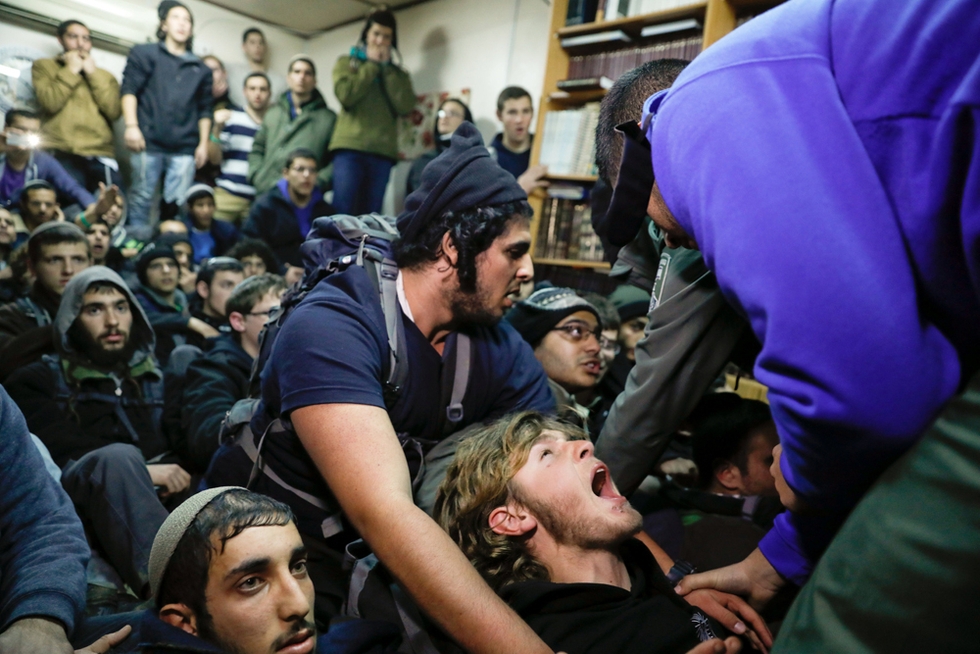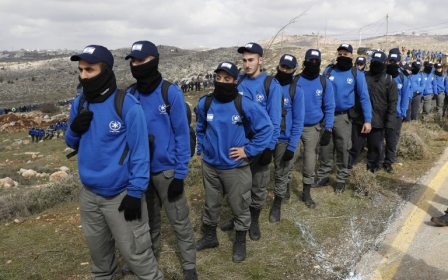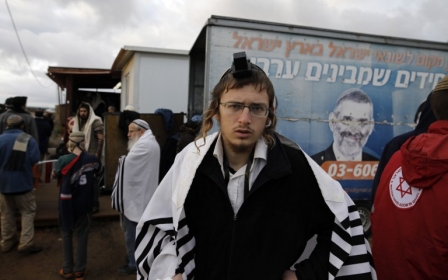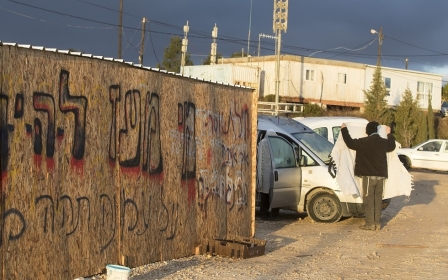Israeli settlers battle police during West Bank eviction

Israeli police clashed on Wednesday with Jewish settlers resisting the eviction of hardline residents of a wildcat outpost, hours after the government authorised 3,000 new homes in other West Bank settlements.
Police said they were "attacked by anarchists with materials that made their eyes burn" in Amona, adding that more than a dozen officers were "lightly wounded by stones and the liquids thrown at them".
Youths confronted police with chants such as "how will you feel tomorrow after you evacuate a Jew from his home?" and "Today it's me, tomorrow it will be you".
About 330 Israeli settlers live in Amona, the largest of scores of outposts built in the West Bank without Israeli authorisation.
Police spokesman Micky Rosenfeld told AFP there were about 3,000 officers in and around Amona to move 42 families.
He estimated that another 600 people who were not from the outpost had arrived to support those being evicted.
The Supreme Court ruled in November, after a lengthy legal battle, that settlers had to leave Amona because their homes were built on privately owned Palestinian land. International law does not recognise this distinction as all settlements are built on Palestinian territory.
With no weapons visible, but wearing backpacks, hundreds of police walked past burning tyres and pushed back against scores of Israeli youths who flocked to Amona in support of the settlers.
Working into the night the forces made slow progress, with three or four policemen at a time lifting each of the protesters out of dwellings in which they had holed up, and carrying them away onto buses.
By dark police said only 22 of Amona's 40 families had left.
Thirteen protesters were arrested by police during the scuffles and there were a few instances of stone-throwing. A police spokesmen said at least 20 officers were injured slightly by rocks and caustic liquid thrown at them.
"A Jew doesn't evict a Jew!" the youngsters chanted.
The Amona settlers themselves largely stayed inside their homes after building makeshift barriers in front of their doors and vowing passive resistance to eviction.
"We won't leave our homes on our own. Pull us out, and we'll go," one settler told reporters. "It is a black day for Zionism."
On a nearby hilltop, Issa Zayed, a Palestinian who said he was one of the owners of the land on which Amona was built, watched the scene through binoculars. "With God's help, it will be evacuated and our land will return to us," he said.
The UN says all Israeli settlements are illegal and has called their proliferation a fatal blow to the hopes of a two-state solution for Palestinians and Israelis.
New settler homes
Earlier, Israel announced plans for 3,000 more settlement homes in the West Bank, the third such declaration in 11 days since Donald Trump took office in the US. Trump has signalled he could be more accommodating toward such projects than his Democratic predecessor Barack Obama.
An announcement a week ago by Israel that it would build some 2,500 more dwellings in the West Bank, territory occupied in 1967 where Palestinians now seek statehood, drew rebukes from the Palestinians and the European Union. It followed approval a few days before of over 560 new homes in East Jerusalem, also taken by Israel in 1967.
"The decision ... will place obstacles in the path of any effort to start a peace process that will lead to security and peace," said Nabil Abu Rdainah, a spokesman for Palestinian President Mahmoud Abbas.
Palestinians want the West Bank and Gaza Strip for an independent state, with its capital in East Jerusalem. Israeli troops and settlers withdrew from Gaza in 2005 but authorities, who control the border, continue to besiege it.
In 2006 Amona saw a violent partial eviction, with nine shacks torn down by authorities. Police were confronted by thousands of settlers and more than 200 people were injured.
The Amona issue had caused tension within Prime Minister Benjamin Netanyahu's coalition government. But it eased after he got behind a law proposed by the Jewish Home party, a far-right political ally, to retroactively legalise dozens of outposts. This would not apply to Amona because of the existing court decision.
"We have lost the battle over Amona but we are winning the campaign for the Land of Israel," cabinet minister and Jewish Home leader Naftali Bennett tweeted after the evacuation began.
The legislation is expected to be passed in parliament next week. It is opposed, however, by Israel's attorney-general and legal experts predict it eventually would be overturned in court.
'A distraction and a trick'
Mustafa Bargouti, a member of the Palestinian Legislative Council, told Middle East Eye that the evictions in Amona was a sideshow to the expansion of illegal settlements across the West Bank.
"What Natanyahu does is big trick and dangerous propaganda, there is no real evection at all. A few settlers are being moved from a few houses on Palestinian private land to other confiscated Palestinian lands," he said.
"There is a use of Amona issue to hide the Israeli decision to build another 3,000 new housing units, (part of a plan) to divide the West Bank in two, surround Jerusalem, and prevent any opportunity for a Palestinian state and the option of two state solution."
Khalida Jarrar, another PLC member, added: "This is an attempt to draw attention away from the thousands other housing units being declared by the Israeli government. They are trying to dramatise the eviction to mask more important issues."
New MEE newsletter: Jerusalem Dispatch
Sign up to get the latest insights and analysis on Israel-Palestine, alongside Turkey Unpacked and other MEE newsletters
Middle East Eye delivers independent and unrivalled coverage and analysis of the Middle East, North Africa and beyond. To learn more about republishing this content and the associated fees, please fill out this form. More about MEE can be found here.




